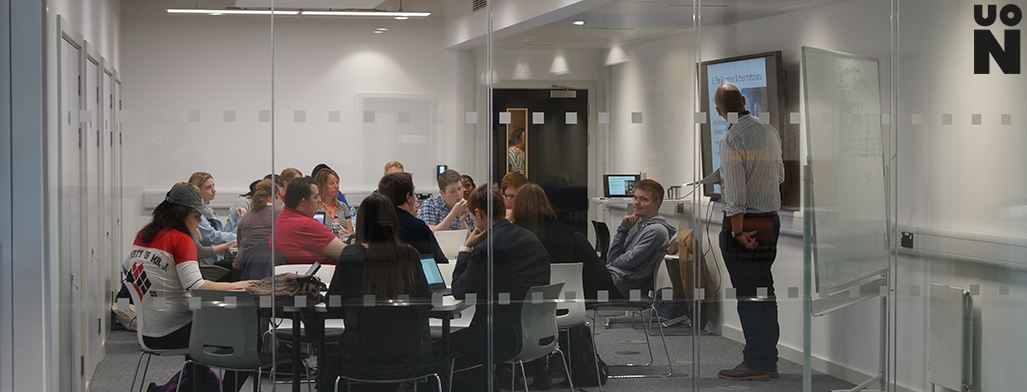Recognition and Funding
Quality Teaching | Meaningful Learning
Recognition and Funding

CATE and NTF
The Learning and Teaching Enhancement team support colleagues across the institution in relation to the Collaborative Award for Teaching Excellence (CATE) and the National Teaching Fellowship Scheme (NTFS).
Each academic year, the University of Northampton can nominate a team to the CATE scheme and up to three individuals for the NTF scheme. This cycle of nomination is launched at the annual learning and teaching conference in June with a selection, mentoring and nomination process resulting in applications being submitted to Advance HE.
Please read How to apply for the Higher Teaching Awards 2023/2024, and if you require more information, please get in touch: lte@northampton.ac.uk

Chris Powis
Director of Library and Learning Services
Chris is Director of Library and Learning Services at the University of Northampton. Alongside responsibility for the library he has academic skills development, learning technology (including the university’s VLE), Educational Linguistics and the central learning and teaching support including academic staff development.
Chris is a National Teaching Fellow, a Principal Fellow of the HEA and a Fellow of CILIP and has spoken and published widely on teaching and learning. He is currently interested in learning environments and the sense of place on campus.

Dr Kimberley Hill
Deputy Head of Psychology
Dr Kimberley Hill is an Associate Professor and Deputy Head of Psychology at the University of Northampton. Kimberley is a Chartered Psychologist, Senior Fellow of the Higher Education Academy and an Associate Fellow of the British Psychology Society. She has worked to create safer night-time economies and transform university responses to tackling gender-based violence, enhancing policy and practice through partnership working with external organisations and global educators. As a National STEM Ambassador, Kimberley is also dedicated to disseminating Psychological knowledge and increase access into education. Kimberley works with students on initiatives and events to enthuse thousands of young people about Psychology.

Learning Enhancement and Innovation Projects
The Innovation Fund is an annual opportunity for colleagues at the University of Northampton to bid for monies to undertake research projects in the field of pedagogical development, research and innovation. The fund has run for over 10 years and in that time has awarded hundreds of thousands of pounds to projects which have impacted how we approach and undertake learning and teaching activities here at the University of Northampton. The funds are awarded in August and the projects are undertaken within the academic year. Each project receives mentoring and support from the Learning and Teaching Enhancement team and the projects are disseminated at the University Learning and Teaching Conference.
Detailed information about the Call and how to submit a proposal is provided in the Call for Innovation Bids
Current Projects
- Pedagogical Tools and Techniques for ABL Phase 1: enhancing learners’ and educators’ potential – Dr Emma Whewell and Alison Power, FHES and FAST
- Diverse representation in the sport curricula: Exploring students’ perceptions, expectations, and engagement – Dr Stacie Gray, FAST
- Learner Attributes: Foundation Vs Undergraduates – Kirsty Wagstaffe, FAST
- STEP Outside: Supporting education students to use outdoor spaces in their professional practice – Dr Tanya Richardson, FHES
- Mentoring scheme for at risk IFY students (pilot) – Rita Bromley, FAST
- Student Led Community Project Placement (SLCPP): Students as Co-Creators of Teaching and Learning – Claire Clinker, FHES
- A study on the impact of emerging AI tools and contract cheating on academic integrity of postgraduate courses within UoN: Staff Perceptions – Dr Suraj Ajit, FAST
- An investigation into policy, practice, and preferences in the assessment of referencing in student coursework – Darren Flynn, LLSS
- Study Smart: Staff and students co-constructing AI literacy at UON – Dr Helen Caldwell, FHES
- Progression from level 4 to course completion: early risk recognition and intervention – Dr Rachel Bassett-Dubsky, FHES
- Developing Strategies for Promoting Academic Responsibility and Self-Directed Learning Amongst Nigerian and Indian Postgraduate Students at the University of Northampton – Al-Amin Dabo, FBL
- Evaluating the Effectiveness of APP’s Practices: An Action Research within the Faculty of Business and Law – Dr Ouarda Dsouli, FBL
Previous Projects
1. Course Redesign for Blended Learning
- Supporting third year trainee teachers and NQT’s personal and professional development, Emma Whewell, FEH
- The Implementation of Active Blended Learning: What effect has it had on teaching and teaching quality at UoN? (2017-18)
- Assessing the barriers to student engagement with Discussion Boards in an Active Blended Learning module (2017-18)
- Building strength through collaboration (2016-17)
- Using Blackboard Collaborate (2016-17)
- Blended learning to using archive material (2016-17)
- Experimenting blended learning in English and Creative Writing (2016-17)
- FEASST@8 (2016-17)
- Evaluating blended learning (2015-16)
- Collaborate and disseminate (2015-16)
- Parklife (2014-15)
- DNA-fc (2014-15)
- ILOOC revisited (2014-15)
- Blended approaches to improve independent learning (2014-15)
- Online and blended learning simulated role play (2014-15)
- Blending with Brisbane (2014-15)
- Material to virtual (2014-15)
- Mashable (2013-14)
2. Digital approaches to teaching, learning and assessment
- ‘Engaging’ students with education: promoting inclusivity through technology: Phase 2 (version 2 plus wider dissemination) – Alison Power / Emma Whewell, FHES and FAST (2022-23)
- Bringing learning alive: empowering the use of immersive technologies to blend physical and digital spaces – Dr Helen Caldwell, FHES (2022-23)
- GAMING: Gamification for the Advancement of Multiprofessional / INterprofessional Groupwork – Alison Power, FHES (2021-22)
- Early Years Virtual Environment – EYVE Devon Rossetti, FHES (2021-22)
- Creating a digital workbook to enhance student academic skills: A self-paced journey. Karin Johnstone, LLS (2020-21)
- Reflections on practice co-created by experts and novices using video collaboration software. Emma Whewell, FAST (2020-21)
- Early Years Virtual Environment – EYVE (pronounced ee-vee). Iain Douglas, FAST (2020-21)
- Creating community: improving module engagement through real-time communication (2017-18)
- Engaging students with skills development through Active Blended Learning (2017-18)
- Evaluating the use of student blogs (2016-17)
- Digital approaches to assessment (2015-16)
- Teaching with Tablets MOOC (2015-16)
- Opps for apps (2014-15)
- Apps for innovation (2014-15)
- The Mentor MOOC (2014-15)
- Gateway MBA (2013-14)
- ILOOC (2013-14)
3. Changemaker
- Agents of Change: Engaging Students in Social Innovation across an Integrated Foundation Year. (part 2) – Kirsty Wagstaffe, FAST (2022-23)
- Those who can, write poetry; Developing teaching assistants’ reflective practice and exploring the personal and professional challenges for those working in schools through the use of poetry – Korrin Smith-Whitehouse, FHES (2022-23)
- STEM4Me: A student-led STEM buddies scheme focused on enhancing primary school pupils’ STEM aspirations, widening participation and improving access to science – Josephine Chen-Wilson, FHES (2021-22)
- Integrating and expanding skills between FBL and FAST (cross faculty) students by embedding changemaker skills and social innovation into student learning. Friedemann Schaber, FAST and Rebecca Fakoussa, FBL (2020-21)
- Agents of change: Engaging students in social innovation across an Integrated Foundation Year. Kirsty Wagstaffe, FAST (2020-21)
- Student persona, Susie Palmer-Trew, Student Union (2020-21)
4. Development learning and teaching resources
- Fostering empathy, critical thinking and reflection in order to enhance students’ adaptability and problem solving-skills through introducing LEGO® SERIOUS PLAY® – REAL TIME CHANGE® methodology into UON curriculum – Gosia Plotka, FBL (2022-23)
- Magic to conjure up academic skills: a gamification approach to dissertation support – Dr Emma Kimberley, LLS (2021-22)
- Pathways – Lisa Anderson, LLS (2021-22)
- Increasing understanding of Active Blended Learning amongst Psychology students (2017-18)
- Core law resources (2016-17)
- Open educational resource to support Team-Based Learning (2016-17)
- Online Photography toolkit (2016-17)
- Role Play (2014-15)
- DECO – developing resources for choreographic practice (2014-15)
- Teaching Assistants in international schools (2013-14)
- Animations for Sports Psychology (2013-14)
- Skills Hub review (2013-14)
5. Change of teaching and assessment practice
- Ensuring the sustainability of co-created pedagogical approaches – A teacher perspective Dr Seydou Ouattara, FBL (2022-23)
- Beyond Safety in Teaching and Learning: Supporting the Delivery of Challenging and Contested Topics – Dr Lauren McAllister, FHES (2021-22)
- Effect of active student engagement in Project-based Learning Environment with Lean Mindset – Dr Rasoul Khandan, FAST (2021-22)
- Evaluating efforts to decolonise the curriculum – exploring the experiences of staff and students at UON. Dr Charlotte Dann, FHES (2020-21)
- Restorative Practices: Inclusive Pedagogy, Nicola Preston, FEH
- Implementation of a fair group marking, and student scoring scheme based upon separate product and process assessment responsibilities, Suraj Ajit, FAST
- Cross-disciplinary collaboration through Peer Observation as a strategy to enhance student engagement and inclusion, Julian Brown, FEH and FBL
- Evaluating the impact of the University Review of Assessment, Rachel Maxwell, ILT
- Exploring academic staff understandings and implementation of diversity and inclusion within the curriculum, Charlotte Dann, FHS
- Learning without teaching and without content: exploring the extremities of active learning (2017-18)
- Exploring diversity in psychology through Active Blended Learning (2017-18)
- Empowerment in teaching and learning (2015-16)
- Peer Assessment (2015-16)
6. Student contribution to teaching and learning
- Children as researchers of their own well-being – Korrin Smith-Whitehouse, FHES (2021-22)
- A day in the life of”: Psychology students as co-creators of teaching, learning and promotional video content – building community and engagement through authentic personas – Dr Rachel Maunder, FHES (2021-22)
- Improving BAME student attainment by using personal stories – Patricia Jeremiah, FHES (2021-22)
- Exchanging experience: a peer-assisted learning approach to mentoring, Lisa Shepherd, FEH
- Investigating the feasibility of co-production of digital media with students, Karin Johnstone, LLS
- Ethics and integrity in staff: student research and academic innovation partnerships, Dave Burnapp, FEH
- Supporting Community to Collaborate and Emotionally Engage in Digital Shifts @ level 8 (SuCCEED@8) (2017-18)
- Stats Mentor: Evaluating the impact of peer learning for research methods (2017-18)
- Hong Kong summer camp and Changemaker (2017-18)
- Narratives for transition (2017-18)
- Communities of Study – sharing work-based experiences (2017-18)
- Creating narratives (2016-17)
- The Stats Mentors (2016-17)
- Digital Leaders (2015-16)
- Follow Northampton (2014-15, 2013-14)
- Hidden Voices (2015-16)
7. Evaluating student experience
- An evaluation of black students’ experiences of Learning Development – Sheryl Mansfield and Beth Garrett, LLS and SU (2022-23)
- Listening to liberate: Using critical reflexivity to liberate students of colour. Nick Cartwright, FBL (2020-2021)
- Transitions and aspirations, Eunice Lumsden, FEH
- TECH4All: Towards a super supportive digital university, Cristina Devecchi, FEH, FAST and LLS
- Evaluating a self-efficacy engagement and retention strategy in the Foundation Study Framework 2017 (2017-18)
- Yes we listen, but do we hear? Unlocking the EWO Student voice (2017-18)
- Student retention (The lecturer’s perspective) (2017-18)
- Concentrated delivery (2016-17)
- Social impact from transformational learning (2016-17)
- Evaluating Foundation Programmes (2015-16)
8. Attainment, Retention and Progression
- Beyond the ‘usual suspects’: Exploring the adoption of ‘good practice’ recommendations for closing the GEM attainment and continuation gaps at UON: PHASE 2 – Siobhan Dytham, FHES (2022-23)
- Exploring Academic Misconduct for GEM students: Some Insights into Student Behaviour and their attainment in Higher Education – Associate Prof. Patrice Seuwou; Nathan Dodzo; Prof. Michael Opoku Agyeman, FBL and FAST (2022-23)
- Study of possible solutions to reduce the GEM Award Gap- A case study of the Accounting and Finance (A&F) subject group – Dr Ouarda Dsouli, FBL (2022-23)
- Understanding the value of sociology in raising engagement, attainment, and retention amongst level 4 sport students – James Mason, FAST (2022-23)
- BAME attainment in HE: Exploring the experiences of African descent students and the factors that impact on their low grades at UON. Dr Patrice Seuwou, FBL (2020-21)
- BAME Attainment in Higher Education: Exploring the Experiences of South Asian Students and the Factors influencing their Grades at Northampton University – Dr Michael Opoku Agyeman, FAST (2021-22)
- Non-submission – what are the implications for closing the GEM attainment gap? – Tim Curtis, FAST (2021-22)
- Understanding level 5 sport and exercise students perspectives of the barriers to progression and attainment at UoN – Emma Whewell, FAST (2021-22)
- Beyond the ‘usual suspects’: Exploring the adoption of ‘good practice’ recommendations for closing the BAME attainment and continuation gaps at UoN – Dr Siobhan Dytham, FHES (2021-22)
9. Postgraduate Students
- Engaging the postgraduate student voice for enhancement of learning and teaching – Dr Tracey Redwood, FHES (2022-23)
- Converting willingness to engagement. Dr Tracey Redwood, FHES (2020-21)




